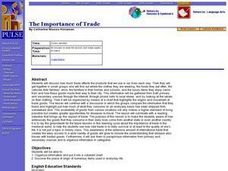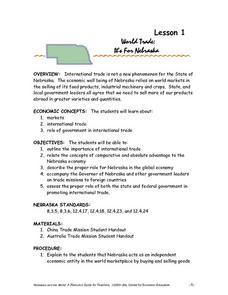Curated OER
"Exploring U.S. Motives Behind WWII Imprisonment and Deportation of German, Japanese, and Italian Latin Americans"
Students research and examine the secret Special War Problems Division program in Latin America and discuss the impact of the program on civil and human rights. They assess the motives for the program and explore various quotes from that...
Curated OER
Belief Systems of the Silk Roads
Students review, compare, and contrast belief systems of the Silk Roads. They analyze primary texts of sacred and philosophical writings. Finally, students recognize the rich diversity of belief systems along the Silk Roads.
Curated OER
Tortured Beauty
Young scholars compare and contrast two fundamentally different treatments of women, one Chinese and one Japanese, and to examine how this reflects on the culture that produced them.
Curated OER
The Importance of Trade
Students discuss how trade affects the products they use everyday. In groups, they identify the clothes they are wearing, the food they eat most often and the cars their families drive. Using the internet, they research how these goods...
Curated OER
World Trade: It's for Nebraska
Students examine markets, international trade, and the role of government in international trade. After reviewing articles on the Governor of Nebraska's recent trade missions, they discuss in small groups their opinions of whether or...
Curated OER
If These Walls Could Talk: Seeing a Culture Through Human Features
Students read Talking Walls and discuss the walls presented and their importance to the culture. For this geography lesson, students locate and label each country/continent discussed in the book on a world map. Students take a walk and...
Curated OER
Energy From Space: The Next Frontier
Students investigate ideas for getting energy from space. For this space-based power lesson, students read articles about ideas for alternatives to fossil fuels. Students define and give examples of vocabulary words. Students answer...
Curated OER
Creating Scrolls Based on the Illustrated Tale of Genji
Now these are learning activities full of fun, art, and cultural exploration. Kids consider the art of storytelling through comic book images. They then look at the Tale of Genji as it was written in the 11th century. They discuss...
Curated OER
Say Hi to Haibun Fun
Students examine the Japanese writing form of Haibun. They identify the elements of Japanese prose and poetry, analyze a haibun for writing devices, complete a graphic organizer, and compose an original haibun as a form of journal keeping.
Curated OER
A Day of Infamy:Analyzing FDR’s Pearl Harbor Address
In 1941 FDR spoke out on the events at Pearl Harbor. The class will get to analyze word choice, word meaning, author's craft and structure by analyzing an actual draft of this speech. They will look critically at the words used,...
Curated OER
Winter Olympics History Year by Year
Investigate the history of the Winter Olympic Games. After researching this event and compiling necessary statistics, pupils use a graphic organizer to chart their findings. A template for a chart is included in this resource. Have your...
Curated OER
You Too Can Haiku
Students conduct Internet research and explain the history of Haiku. After listening and reading various examples of Haiku, students use their own vocabulary and practice their math skills to determine the correct number of syllables...
Curated OER
Environmental Law
Students analyze the environmental impact of pollution. They demonstrate an understanding of law, punishment and enforcement. Applying their knowledge, they create their own anti-pollution laws.
Curated OER
Arsenic Contamination: Water Filtration
Students work in groups to design a filtration process that will separate clean water from polluted water. They organize data in tables or graphs and present their findings to the class. Students identify further safety protocols that...
Curated OER
Shadow Puppetry in South India
Students read a variety of literature from India, including folktales and fables. They then select a scene or story to script, work together to design and craft shadow puppets of characters and scenery, narrate a story, manipulate the...
Curated OER
Feelings On Japanese Internment
Students listen to the story, "The Bracelet" and evaluate with other class members right and wrong actions. They create a watercolor painting that describes how the book made them feel and discuss their feelings with the rest of the class.
Curated OER
Dango
Students discuss lines, shapes, patterns, and colors used in Jun Kaneko's piece Untitled (Dango). In groups, they help make a paper Mache replica and demonstrate their understanding of lines, shapes patterns, and colors by painting their...
Curated OER
Natural Hazards
Students evaluate the hazards of naturally occurring events. After watching a video concerning safety hazards, students work in groups to discuss the safety issues involved in taking a trip to a mountainous region. Recommendations are...
Curated OER
A Pair, A Panel, A Presentation: Creating an Image for Your School
Young scholars create a screen for the school. They work as a group to create a screen using various scenes from the school. Once they have finished their project, they explain why the artist chose to use the scenes from his time period.





















